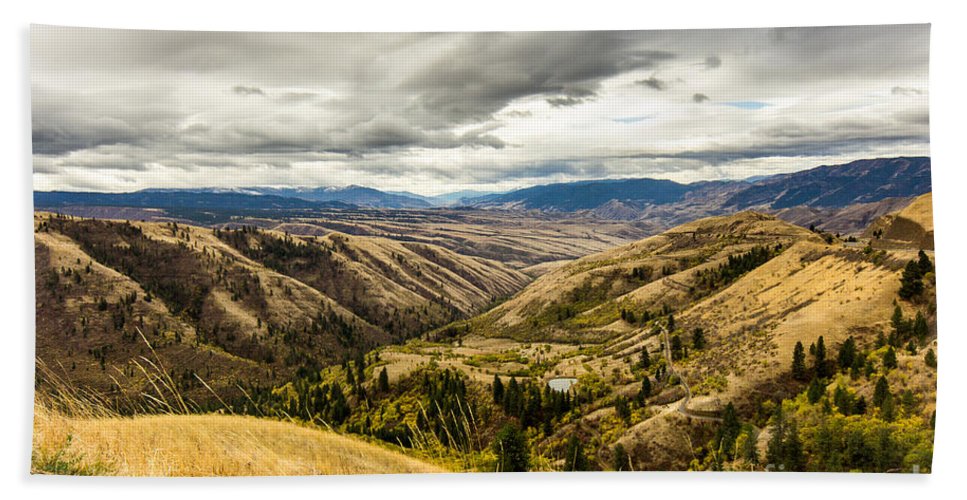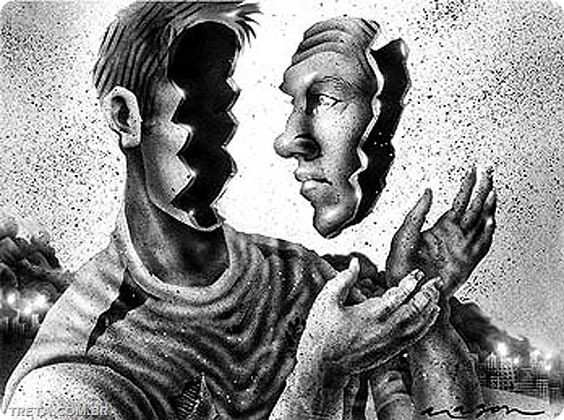It’s late morning, a typically hot summer morning inland in California. But a fine breeze blows through the brown hills, and it takes the edge off the heat, making the hike enjoyable.
Under a spotless sky, desiccated winter grasses shimmer a golden tan in the breeze. A careless match, or even a spark from an engine, could ignite a fire. I passed a charred area on the way in, which had been quickly extinguished.
A coyote left its scat on the trail in four places. The turds are as dry as the dirt around them. The message is clear: this is my home, not yours, human.
I climb up to within a hundred meters of the dark volcanic rock along the rim of the canyon, walking slowly. Descending along the trail that parallels the gravel road below into the canyon, I clamber down a steep and narrow section between huge granite boulders. Below them, the faintest trickle of water flows by, keeping a small patch of grass green during the rainless months. In the silence of the canyon, one can hear, in that single trickling note of water, the music of the universe.

A line from Thoreau comes to mind: “There is naked Nature, inhumanly sincere, wasting no thought on man.”
Sweating, I end the walk at the stream. I quickly strip down and slide into the cool water, floating down on the gentle current, swimming back upstream a number of times. The light reflects and refracts off the multi-colored rocks on the streambed.
True meditation is the most important thing, since without unwilled negation in meditation, the increasing darkness of human consciousness suffocates even the strongest spirit. Quieting and emptying the mind is the source of peace and insight, as well as the fountainhead of our own uniqueness as individuals.
Whether humankind changers course in our lifetimes or not, the awakening of intelligence in the individual is essential—sine qua non. A true individual is as the word literally means—not divided. A drop of water contains the ocean.
Passive, self-knowing observation is the foundation of method-less meditation, in which the chattering, destructive movement of thought spontaneously stops as attention gathers unseen deep within the brain.
When the inner foundation in the individual is poured through self-knowing and attention, only then will the outer, social dimension be adequately addressed.
For tens of thousands of years, the now dying human species has been based conditioning, complacently resigned as unavoidable political and consumeristic propaganda. A human being, on the other hand, grows in unconditioning herself through self-knowing, attention and insight.
Children seem to absorb conditioning as easily they absorb language. However if parents and teachers were attentively self-knowing, the child would be raised in completely different way, in a completely different atmosphere, and perhaps need not be conditioned at all.
Education is not merely the transmission of knowledge and the preparation for a career. Education literally means, “to draw forth” the potential of the child.
A malevolent POTUS wants children back in school not because he cares about them and their education, but because he and the dark forces within and behind him are worried that parents, teachers and children might actually begin learning in a new way.

Knowledge and skill are important aspects of education, but they are secondary to non-accumulative learning. Self-knowing (not self knowledge) is true “lifelong learning,” not continual acquisition of knowledge and skills.
Don’t try to teach children to meditate. It cannot be taught, just as listening cannot be taught, only conveyed and absorbed through example. Be attentive and self-knowing, and you’ll create an atmosphere of awareness and mindfulness. The space for listening and attending cannot be forced. Intentionally conditioning children is evil.
As the parent is responsible for creating an atmosphere of awareness and attention in the home, the teacher is responsible for creating an atmosphere of awareness and attention in the classroom, even if the classroom is outdoors.
Parents and teachers, begin the day by listening to the sounds around you with children. If you live in a big city, ask if they heard a bird. If you’re outdoors in a quiet setting, ask them to notice what happens in their minds and hearts when they deeply listen the sounds in their environment.
Martin LeFevre
No comments:
Post a Comment